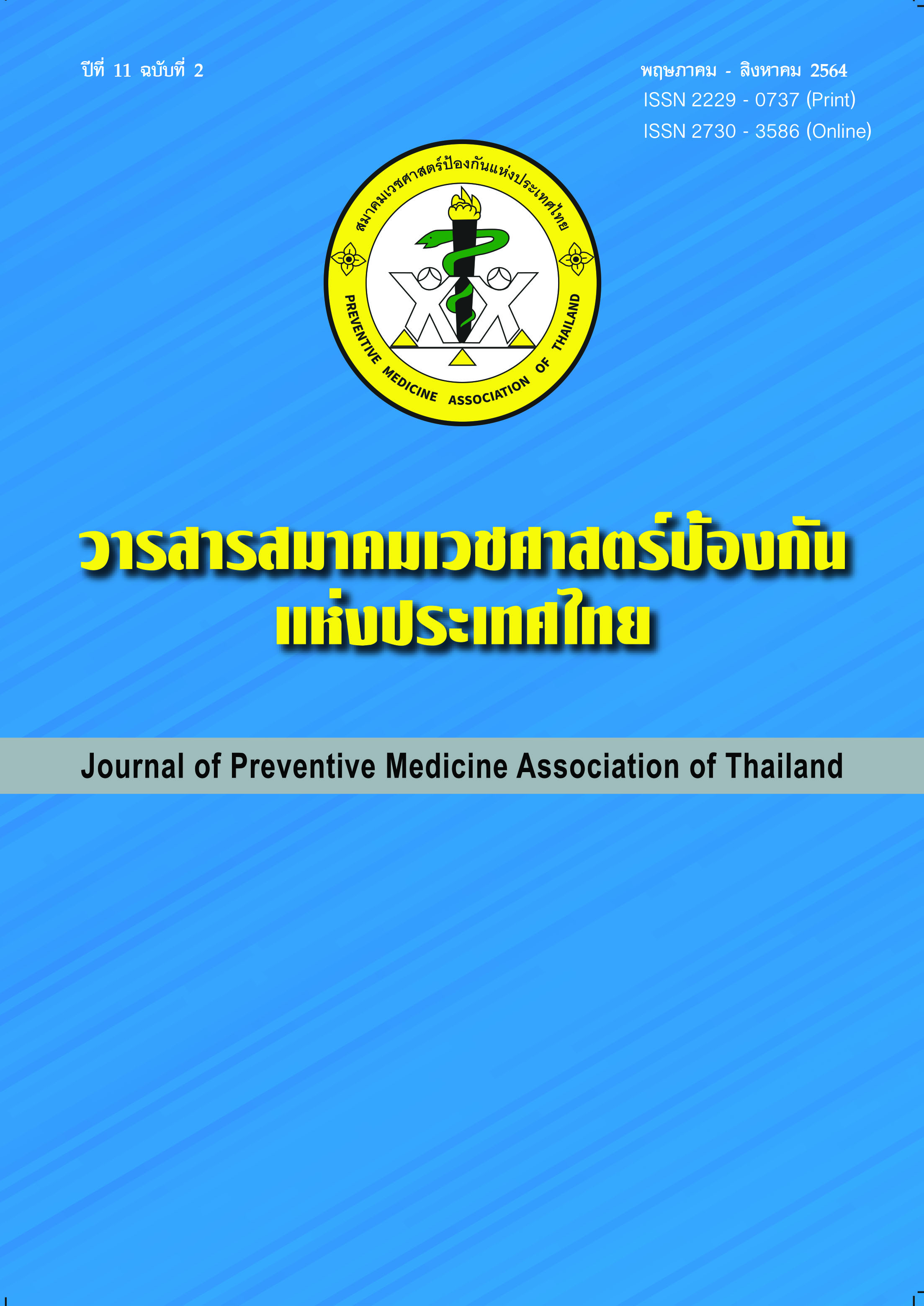Corporate governance model for drinking water vending machines of local government organizations in Nonthaburi Province
Keywords:
corporate governance model, drinking water vending machine, Local government organizationAbstract
This research is aiming to study the service situation and the corporate governance model for drinking water vending machines of local government organizations in Nonthaburi Province. The population were used in the study in total 1,683 drinking water vending machines, which were surveyed by local government organizations in Nonthaburi Province between April - September 2020. The qualitative data was studied by focus group discussion with 12 public health and environment executive of municipalities and sub-district administrative organizations. Data was analyzed by using basic statistics to characterize the population and content analysis for focus group discussion. The results of the study revealed that most of the places surveyed for drinking water vending machines were residences. The owner of the places are the owner and do not have the license to operate drinking water vending machines. The location and manner of drinking water vending machines are mostly hygienic. All water sources come from tap water. There were no results of the drinking water quality analysis according to the drinking water standard but the bacterial analysis by simple test kit of some local government organizations was operated. Most of the site area, surfaces, drainage channels, water nozzles and water tanks inside are washed and cleaned. The filter material are cleaned and replaced according to the product instructions. Most of them do not have any instructions and warnings on the label. All drinking water vending machines do not have a record of water quality inspection and maintenance operations. Most of the bacterial analysis results by simple test kit were negative. Local government organizations have proposed the appropriate guidelines to be a corporate governance model for drinking water vending machines by issuance of local commandment under the Public Health Enactment 1992, publicity of the established guidelines in local commandment and information related to drinking water vending machines, proceedings of the law in case of doing business without permission, surveying the basic data, work planning and budgeting for monitoring water quality, recommendations for improvement and follow-up, issuing a certificate of passing hygienic assessment and bacterial contamination in the water, creating network partners and training to educate / develop network partners' potential in caring of drinking water vending machines.
References
2. สาลินี ศรีวงษ์ชัย, ณัฐชนันท์ วงศ์กำภู, พรทิพา เทียนเพลิง,และผกาวรรณ อุดร. คุณภาพของน้ำดื่มจากตู้น้ำดื่มหยอดเหรียญที่จำหน่ายในจังหวัดสระแก้ว. วารสารวิทยาศาสตร์แห่งมหาวิทยาลัยราชภัฏเพชรบุรี 2560; 14: 13-27.
3. น้ำทิพย์ มุมมาลาและสุรศักดิ์ เสาแก้ว. สถานการณ์ของบทบัญญัติท้องถิ่นในการกำกับ
และดูแลคุณภาพมาตรฐานของน้ำดื่มตู้หยอดเหรียญอัตโนมัติ จังหวัดเพชรบูรณ์. วารสาร
อาหารและยา 2561; 25: 64 -74.
4. เทศบาลนครแหลมฉบัง. สถานการณ์การเฝ้าระวังตู้น้ำดื่มหยอดเหรียญ ปี 2560
[อินเทอร์เน็ต]. 2560[เข้าถึงเมื่อ19 พ.ค.2564]. เข้าถึงได้จาก http://www.lcb.go.th/
files/com_networknews/2021-01_d175ec943738de1.pdf
5. จุตรพร สิงหรัญ. แนวทางการบังคับใช้กฎหมายสำหรับควบคุมคุณภาพน้ำบริโภคจาก
ตู้น้ำดื่มอัตโนมัติ ในกรุงเทพมหานครและปริมณฑล [อินเทอร์เน็ต].2564 [เข้าถึงเมื่อ
18 มิ.ย.2564]. เข้าถึงได้จาก http://www.engrlw.ru.ac.th /conference/pdfposter
ELI09%20จตุรพร.pdf
6. นพคุณ ยรรยงค์, สุธน เพ็งคุ้ม, โชคชัย เกตุสถิต, พิมพ์พิชญ์ สังข์แป้น. การประเมิน
คุณภาพน้ำดื่มจากตู้น้ำดื่มหยอดเหรียญในพื้นที่เขตบริการสุขภาพที่ 2. วารสาร
สุขาภิบาลอาหารและน้ำ 2558; 6: 20-34.
7. วิศิษฎ์ ทองคำ, จินดาวัลย์ วิบูลย์อุทัย, ธนัชชา ชนะพันธุ์, พนัชกร มุมอ่อน, ลักษณา
ต้องตา และสุณีรัตน์ ยั่งยืน. การประเมินการรับสัมผัสจุลินทรีย์ก่อโรคในการบริโภค
น้ำดื่มจากตู้น้ำดื่มหยอดเหรียญ. วารสารการพัฒนาสุขภาพชุมชน มหาวิทยาลัย
ขอนแก่น 2560; 5: 605-624.
Downloads
Published
How to Cite
Issue
Section
License
บทความที่ลงพิมพ์ในวารสารเวชศาสตร์ป้องกันแห่งประเทศไทย ถือเป็นผลงานวิชาการ งานวิจัย วิเคราะห์ วิจารณ์ เป็นความเห็นส่วนตัวของผู้นิพนธ์ กองบรรณาธิการไม่จำเป็นต้องเห็นด้วยเสมอไปและผู้นิพนธ์จะต้องรับผิดชอบต่อบทความของตนเอง






